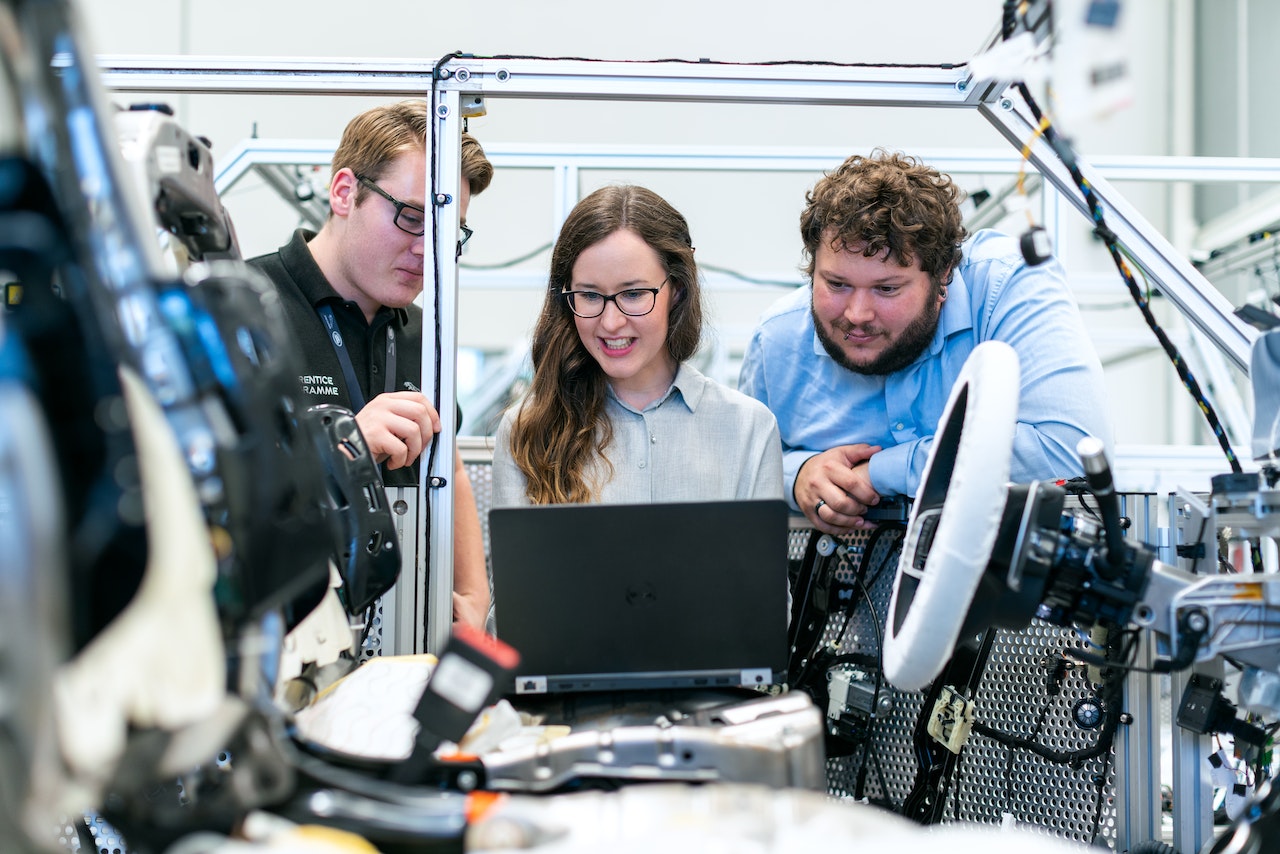Artificial intelligence is a machine’s ability to perform the cognitive functions that a human mind usually performs. AI in the automotive industry encompasses a variety of technologies, including machine learning, computer vision, NPL, speech analytics, robotics, and more. These technologies have helped to develop self-driving cars as well as personal assistance and advanced driving assistance systems.
The world of AI is constantly growing and changing and also changing the future of the automotive industry.
The Role Of AI In Cars Today
AI is being used in almost all areas of the automotive industry to improve the driving experience.
Here are some key ways the use of AI in the automotive industry is happening.
1. Driver Assistance
Driver assistance is one of the most common and useful uses for the automotive industry intelligence. AI systems use sensors to assist with steering, monitor blind spots, pedestrian detection, and more. The system then enables the driver so they can take preventative measures to prevent accidents.
2. Autonomous Vehicles
Autonomous vehicles are considered to be the best use of artificial intelligence in cars. With the use of AI in cars like machine learning, big data, and deep learning, self-driving cars can drive autonomously with almost no human interaction and follow safe driving rules.
3. Driver Monitoring
AI in cars monitors whether it is the normal driver in the car or someone else and then automatically adjusts the seat, mirrors, and even temperature. AI systems also monitor the driver’s eyes and head position to assess drowsiness and wake up the driver.
The Impact Of AI on the Automotive Industry
The impact of AI on the automotive industry doesn’t just stop at the driver’s experience. AI is also present in other parts of the process, including:
1. AI In Manufacturing
The automotive industry relies on manufacturing, and even small errors can cause serious issues. AI technology can improve the car-making process by making it more efficient. For example, robots can autonomously pick parts and speed up the manufacturing process.
2. Personal Assistant
While most automotive companies use third-party voice assistants like Siri, some build their voice-recognition software. This AI-enabled personal assistance allows the driver to make calls, adjust the temperature, play music, tell the user about the gas tank level, and more. Voice recognition tools also have high personalization to remember drivers’ interests and make adjustments based on their history.
3. Passenger Experience
AI technologies like image data, nLP, and object identification consider the passengers’ experience and safety on the road. Specific commands also allow passengers to listen to particular music, order food or do other activities while on the road.
4. Auto Insurance
AI also has a role in auto insurance. AI algorithms speed up the claims process when an accident occurs. AI capabilities such as image datasets and object detection can help the driver with accident data. AI also helps insurance companies process images and analyze damage to vehicles.
5. Connection
AI systems enable vehicles, mobile phones, smartwatches, and other infrastructure to connect with one another, making driving a safer experience. Connected cars can also communicate with one another on the road to help maintain a safe distance. They also allow those who manage traffic to get a picture of the road situation and manage the flow of traffic.
6. AI In Car Design
Automotive manufacturers have to map out ideas for cars, design them, and more, which can be time-consuming. AI also helps minimize the time spent on approval of a design and generates endless designs for better product ideas.
7. Quality Control
Maintaining the quality of vehicles is a primary concern to keep a higher customer count. Inspecting vehicles manually can result in fewer defect detection and higher turnaround times. AI-based data annotation helps manufacturers detect the smallest defect at an early stage before the issue becomes critical. The AI system tells the manufacturer which parts of the vehicle need to be changed and which parts need maintenance.
8. Supply Chain Management
AI is a valuable innovation for managing complex supply chains. Just one vehicle has around 30,000 parts coming from different places worldwide, making it hard to monitor the transit of these parts. AI in the supply chains can help manufacturers create a fully automated system to manage the supply chain system and adjust volumes and routes.

Case Studies: How Is AI Used In The Automobile Industry?
Here are some real-world examples of how AI is being used in the automotive industry.
1. Analyze Road Conditions
With the help of AI, vehicles can analyze road conditions automatically. The software can recognize traffic lights with automated imaging and put on the brakes if the light is red. This solution also uses pedestrian mapping and traffic flow analysis to improve the experience.
2. Customer Support
AI-powered chatbots have become common and are reinventing customer service, and their abilities can be beneficial for the customer experience. These tools can hyper-personalize and allow a customer to suggest the best fit. They also help manufacturers solve questions for faster resolution.
3. Emission Monitoring
AI can be applied to corporate sustainability to increase savings by reducing vehicle emissions. AI aids in emission tracking and can collect data from operational activities. It can also source from satellites to find missing data and monitor emissions.
4. Predicting Vehicle Maintenance
AI can inspect automotive parts over time, enabling algorithms to get stronger and identify issues. AI software can provide the driver with actions they can take with their vehicle and its maintenance in real-time. It uses data points to alert drivers promptly and improve efficiency.
5. Fleet monitoring
AI fleet monitoring systems allow for real-time tracking and analysis. AI can process GPS, sensors, telematics, and more to monitor vehicle performance, fuel use, driver behavior, and maintenance. This allows for proactive maintenance, route optimization, and improved efficiency and safety.
6. Cost Savings
Using AI in the automotive industry has helped to reduce costs for operations, designing, and manufacturing. AI has reduced costs by improving supply chains, identifying issues, etc.
7. Navigation
AI has helped drivers make better navigation decisions by analyzing road situations. Modern AI navigation can suggest better routes based on nearby road closures, accidents, road conditions, and more.
The Future of AI In The Automotive Industry
It is expected that AI will exponentially increase in the automotive industry, with an annual growth rate of 55 percent between 2023 and 2033. Here are some ways AI will change in the industry in the future.
1. Many car manufacturers will be using OEM-based AI chips that will focus on different functions of the vehicle. AI will support lights, cruise control, and an autonomous driving system.
2. Autonomous cars are expected to increase to a value of $30 billion by 2023. This growth is due to the advancement of self-driving assistance technology.
3. The market share of autonomous vehicles is expected to grow by 10.9 percent, reflecting the increasing demand for autonomous vehicles.
4. Automotive Advanced Driver Assistance Systems (ADAS) is predicted to grow with an expected annual growth rate of 9.6 percent, showing the adoption of advanced safety technology in the automotive industry.
5. AI will become critical in dealing with supply chain challenges and playing a role in the production and sales of vehicles. AI will be used to analyze sales and vehicle data to help regulate production based on real-time demand.
6. There is a broader push to make the car buying experience more seamless and efficient. AI will help by simplifying the decision process for the customer and making the car buying experience high-quality.
7. More car manufacturers will begin to use AI solutions to improve vehicle safety. We are getting closer to semi-autonomous vehicles than ever before.
8. AI researchers are working to understand human language to develop voice-enabled and in-car systems that better interpret driver voices.
Is AI The Future?
AI technology is a useful tool in the automotive industry for everything from design development to improving the driver and passenger experience. One of the most important ways that AI is changing the automotive industry is by preventing accidents by assessing drivers and road conditions.
The future we can expect from AI is making the car buying process seamless, improving vehicle safety, increasing the ability to interpret driver voices, analyzing sales data to evaluate demand, and more. All future AI developments are expected to make the user experience more personalized, convenient, and safer.


